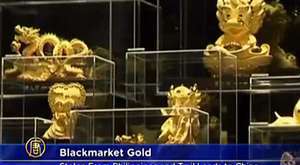Philippines Black Market is China's Source of Cheaper Gold
High world gold prices are a boon to small-scale miners in the southern Philippines these days, and a mine worker can earn ten times as much as a laborer in Manila.
Mr Landa needs it to support his eight children.
[Camilo Landa, Mine Worker, Father of Eight]:
"I'll be able to buy rice to eat. I can pay our loans. I'm happy."
But while miners are flourishing, the Philippine government is losing out.
By law, gold produced in the country's small mines should be sold to the Central Bank, to pump up their reserves.
But the bank's purchases have plummeted by 98 percent this year.
Many point out that a newly imposed tax on gold is the reason behind the rise in smuggling.
Officials and sources say the gold is being smuggled to Hong Kong, before disappearing into China.
[Leo Jasareno, Director, Bureau of Mines and Geosciences]:
"Our suspicion is that it's either black market or smuggled out of the country. So 80 percent of gold, lost."
[Arthur Uy, Owner of Small Mines and Local Governor]:
"The black market now is flourishing, so they would sell now their produce now to the black market."
Reports of illegal sales to China are unverified, but official data from Hong Kong shows gold shipments from the Philippines went from a mere 24 pounds in the year 2000 to 90 tons in 2010.
But in a puzzling discrepancy, Philippine customs only accounted for three percent of that volume.
The government is set to impose strict control on small scale mines.
Illegal mining now accounts for up to 15 percent of global gold output.
video credit to NTDTV























